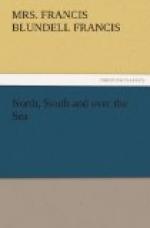Roseen had been making butter when her grandfather entered, and, turning round, displayed a face rosy with her exertions, and arms bare to the elbow.
“So here ye are,” remarked Peter, his grim face relaxing as much as was possible to it; “I’ve been lookin’ for ye everywhere. Do ye know what I am after doin’ for you this fine mornin’?”
“What?” asked Roseen, a little apprehensively, while the colour deepened in her cheeks. Peter leaned against the long stone shelf that ran round the dairy wall, and smiled before replying: “I am after makin’ the finest match for you that’s to be had in all the country side.”
The flush mounted to Roseen’s very temples and then died away; she paused a moment to steady her voice before venturing on a query. “I seen Mr. Quinn goin’ down the road a little while ago—is it him?”
“Ah, you little rogue! you were on the lookout, were ye?” cried Peter jocosely. “Well, you are right; it is him. You are the rale lucky girl, Roseen! You’ll be the richest woman in the town-land.”
Roseen glanced down, apparently wrestling with some inward emotion, and presently observed in a small, strangled voice: “Sure, he is twenty year older nor me.”
“What matter?” said Peter; “he’ll be all the better able to take care o’ you. It’s better to marry a man with sense, nor to go takin’ up with some young whipper-snapper that would be thinkin’ of nothin’ but spendin’ money and carryin’ on with nonsense.”
“He’s an ould widower,” cried Roseen, wrinkling up her little nose with an expression of disgust.
“Well,” said Peter, “an’ a good thing too; you’ll come in for all the beautiful dresses and jewels and things the first Mrs. Quinn left behind.”




